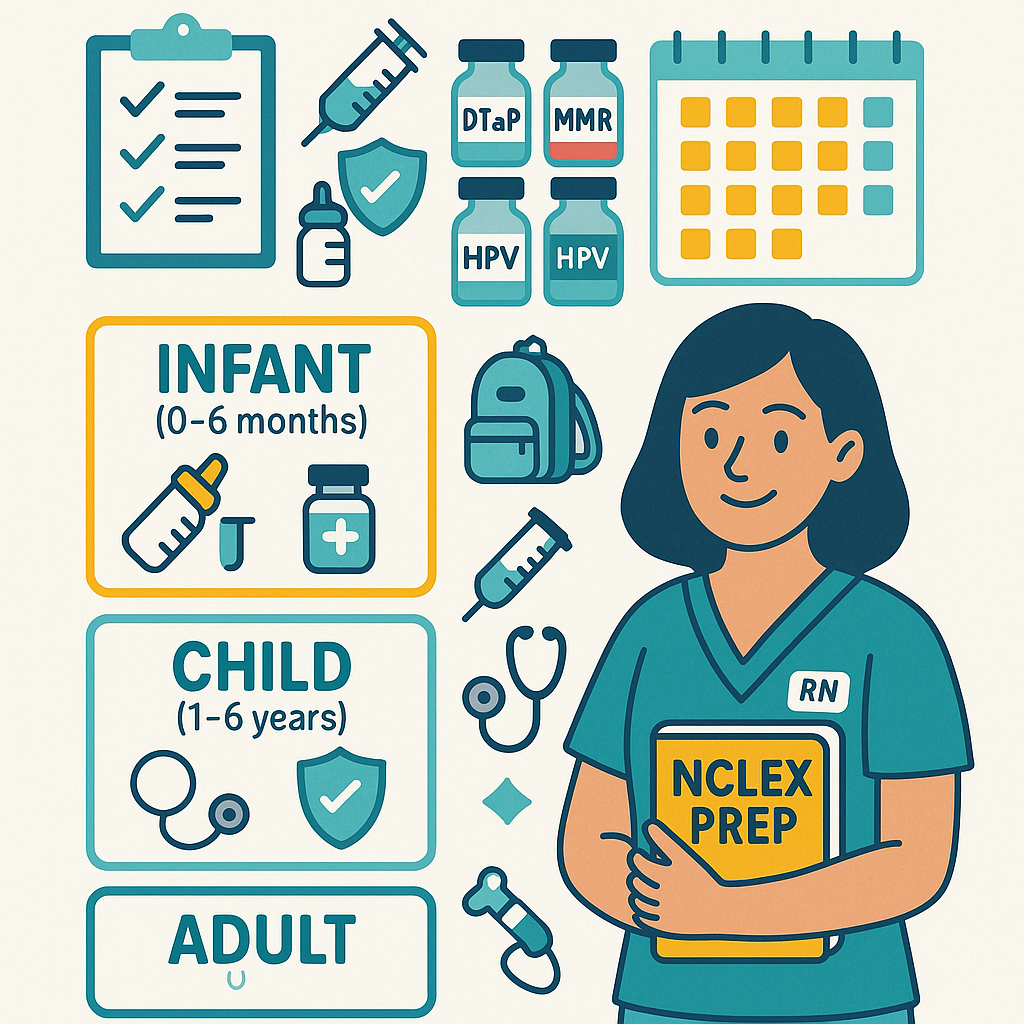For every NCLEX prep nurse, knowing the vaccination schedule is essential. From birth to adulthood, vaccines protect patients from serious diseases. Whether you’re a registered nurse, RN nurse, or a student reviewing your nursing bundle, this cheat sheet simplifies what to give, when, and why.
👶 Infant & Childhood Vaccination Schedule (0–6 Years)
Vaccines during this stage build early immunity and prevent potentially deadly childhood diseases.
| Age | Vaccine(s) | Why It’s Important |
|---|---|---|
| Birth | Hepatitis B (1st dose) | Prevents liver infection from Hep B virus |
| 2 months | DTaP, IPV, Hib, PCV, RV, Hep B (2nd dose) | Prevents whooping cough, polio, meningitis, etc. |
| 4 months | DTaP, IPV, Hib, PCV, RV | Booster for strong early immunity |
| 6 months | DTaP, IPV, Hib, PCV, RV, Hep B (3rd dose) | Continues immunity building |
| 6–18 months | Influenza (yearly), Hep B | Flu shot starts at 6 months annually |
| 12–15 months | MMR, Varicella, Hib, PCV, Hep A | Measles, chickenpox, and Hep A protection |
| 15–18 months | DTaP | Booster to extend protection |
🔑 NCLEX tip: Remember DTaP is for children <7 years old, Tdap is for older children and adults.
🧒 Ages 4–6 Years
| Age | Vaccine(s) | Why It’s Important |
|---|---|---|
| 4–6 years | DTaP, IPV, MMR, Varicella | Final childhood boosters before school entry |
👧 Ages 11–18 (Preteen & Teen Vaccines)
| Age | Vaccine(s) | Why It’s Important |
|---|---|---|
| 11–12 years | Tdap, HPV (2-dose series), Meningococcal | Prevents tetanus, cancer-causing HPV, meningitis |
| 16–18 years | Meningococcal (booster), Flu (yearly) | Booster needed before college or dorm life |
💡 Nursing tip: The HPV vaccine is most effective before sexual activity begins.
👩 Adults & Special Populations
| Population | Vaccine(s) | Why It’s Important |
|---|---|---|
| Adults (19–49) | Tdap every 10 years, Flu annually | Continual immunity against tetanus and flu |
| ≥ 50 years | Shingles (Shingrix, 2 doses), Pneumococcal | Protects against shingles and pneumonia |
| Pregnant women | Tdap (3rd trimester), Flu | Protects mother and baby |
| Healthcare workers | Hep B, MMR, Varicella, Influenza, COVID-19 | Reduce risk of spreading infection |
🧠 NCLEX question alert: Expect questions about pregnancy vaccines (no live vaccines like MMR) and which vaccines are safe to give in different age groups.
💉 Live vs. Inactivated Vaccines
| Live Vaccines | Inactivated Vaccines |
|---|---|
| MMR, Varicella, Rotavirus, Flu (nasal) | Hep B, DTaP, IPV, Flu (shot), HPV |
| Not safe for immunocompromised | Safe for almost all patients |
📝 Vaccine Schedule Mnemonic
“B Dr HIP” for 2, 4, 6 months:
- B – Hepatitis B
- D – DTaP
- R – Rotavirus
- H – Hib
- I – IPV
- P – PCV
This helps nursing students memorize core infant vaccines for the NCLEX exam.
📚 NCLEX Tips on Vaccines
- Always check patient age before giving vaccines.
- Live vaccines are contraindicated in pregnancy and immunosuppression.
- Document vaccine name, lot number, site, route, and patient response.
- Report any adverse reactions using the VAERS system.
- Encourage vaccine education to reduce hesitancy.
💡 Patient Teaching Points for Nurses
As a registered nurse, educating parents and patients is crucial:
- Use visual guides or cheat sheets.
- Explain benefits vs. risks simply.
- Address myths kindly but firmly.
- Offer follow-up reminders for 2nd or 3rd doses.
👍 Good communication builds trust—and improves vaccine compliance.

